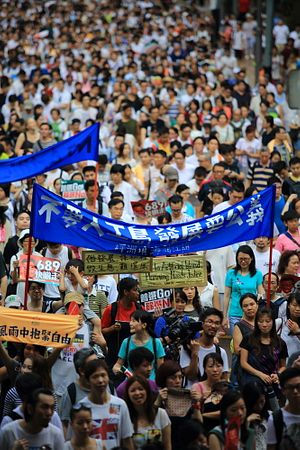Pro-government supporters marched in Hong Kong on Sunday in a show of solidarity against Occupy Central. The tit for tat between the pro-democracy and pro-establishment movements has been growing in recent months, with Beijing playing a strong defense.
As is often (if not always) the case when it comes to pro-Beijing protests, the event itself was somewhat marred by interference — with claims that those who turned out were paid to be there by organizations such as the Hong Kong Livestock Industry Association. A mysterious mass Whatsapp message witnessed by Reuters offered over 350HKD (about $45) to those who turned up. However, Beijing got what it needed out of the protest, which was propaganda — making sure that, whatever the numbers are, they’re enough to keep up with the pro-democracy camp.
Hong Kong University estimated the crowd at 88,000 (less than half their estimate for the pro-democracy rally on July 1). The organizers of the pro-Beijing protest claim that 120,000 turned out, and the state-run newspaper, the Global Times, claims hundreds of thousands. The Hong Kong police, whose numerical prowess is hindered somewhat by politics, had a very different view in saying that there were 111,800 — even more than the 98,600 they counted on the July 1 protest. Organizers of the July 1 march claimed around half a million attended and independent estimates put the number at well over 170,000.
While Beijing is doing its level best to depict the movements as competing ideologies that must eventually come down on the side of the central government, it’s not exactly a fair fight for either camp. Occupy Central has the momentum and a cause, which is universal suffrage and more space from Beijing. The anti-Occupy side doesn’t really have a rallying call other than legality and anti-democracy sentiment — all highly influenced by Beijing itself. However, it’s important to note that Occupy has little open support outside of its own movement. The Hong Kong government has come down firmly on the side of Beijing and shows no sign of budging, but that of course is to be expected — it’s the very reason Beijing doesn’t want universal suffrage in the first place.
Added to that, if Occupy is looking for any support from Beijing’s subjects on the mainland, they are bang out of luck. Pro-democracy, as if it needs to be said, is a sensitive topic according to Beijing — and in China, “sensitive” means “brutally censored.” All the pro-democracy followers are denounced as “Western worshipers,” “extremists,” and “radicals.” The pro-Beijing side is always depicted as patriots, such as the case of Ambrose Lam San-keung, whose support of judicial “patriotism” for the mainland caused a vote of no confidence from the Law Society of Hong Kong this week, 2,392 to 1,478 votes.
Beijing has the establishment firmly in pocket, a situation that breeds instances of underreporting or non-reporting of pro-democracy incidents in Hong Kong on the mainland. So, while the incident of the 800,000 strong referendum made either no news or angry news on the mainland, the 1.46 million person petition against Occupy Central was proudly plastered across the nation’s newspapers.
On the recent pro-establishment protest, the government made their position clear: “In different societies, street politics serves (sic.) different purposes. In the developed democratic countries, demonstrations are not often used for political fights and do little damage to a country’s political operation. But in a developing community, it can evolve into a revolution and even topple the existing regime.” This bold statement, especially bold considering the complete cluelessness of the source, continued: “In Hong Kong where democracy is supposed to be fully developed, some radicals have resorted to street movements such as Occupy Central to express their opinions and impose their will on the whole society, while others also have had to adopt the same methods to show their anti-Occupy Central stance.”
So, yes, even Beijing has to admit they’re on the defensive, but it’s not for a lack of resources. While Occupy can preach democracy and human rights, Beijing is left only with vague notions of legality and status quo. Beijing does, however, have all the power and influence it needs to keep Occupy in check, for now.
































